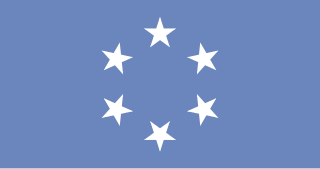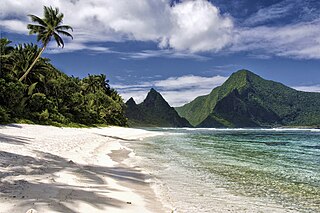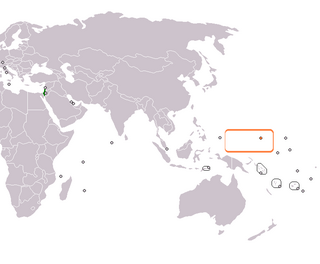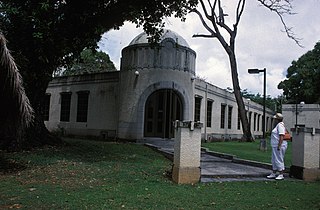Related Research Articles

Palau is an island country in Oceania, in the western Pacific. The republic consists of approximately 340 islands and connects the western chain of the Caroline Islands with parts of the Federated States of Micronesia. It has a total area of 466 square kilometers (180 sq mi). The most populous island is Koror, home to the country's most populous city of the same name. The capital Ngerulmud is located on the nearby island of Babeldaob, in Melekeok State. Palau shares maritime boundaries with international waters to the north, the Federated States of Micronesia to the east, Indonesia to the south, and the Philippines to the northwest.

The politics of Palau take place in a presidential representative democratic republic, whereby the President of Palau is both head of state and head of government. Palau currently has no political parties and is a de facto non-partisan democracy although there is no law preventing the formation of political parties.

The Trust Territory of the Pacific Islands (TTPI) was a United Nations trust territory in Micronesia administered by the United States from 1947 to 1994. The Imperial Japanese South Seas Mandate had been seized by the US during the Pacific War. The Federated States of Micronesia, Marshall Islands and Palau are today independent states in a Compact of Free Association with the US. The Northern Mariana Islands remain under US jurisdiction, as an unincorporated territory and commonwealth.

Palau gained its independence October 1, 1994, with the entry into force of the Compact of Free Association with the United States. Palau was the last Trust Territory of the Pacific Islands territories to gain its independence. Under the Compact, the U.S. remains responsible for Palau's defense for 50 years.

In the law of the United States, an insular area is a U.S.-associated jurisdiction that is not part of the 50 states or the District of Columbia. This includes fourteen U.S. territories administered under U.S. sovereignty, as well as three sovereign states each with a Compact of Free Association with the United States. The term also may be used to refer to the previous status of the Philippine Islands and the Trust Territory of the Pacific Islands when it existed.

Territories of the United States are sub-national administrative divisions overseen by the federal government of the United States. The various American territories differ from the U.S. states and Indian reservations as they are not sovereign entities. In contrast, each state has a sovereignty separate from that of the federal government and each federally recognized Native American tribe possesses limited tribal sovereignty as a "dependent sovereign nation". Territories are classified by incorporation and whether they have an "organized" government through an organic act passed by the Congress. American territories are under American sovereignty and, consequently, may be treated as part of the United States proper in some ways and not others. Unincorporated territories in particular are not considered to be integral parts of the United States, and the Constitution of the United States applies only partially in those territories.


The House of Delegates of Palau is the lower house of the Palau National Congress, Palau's bicameral legislature. The Senate of Palau is the upper house. The House of Delegates has 16 members, each serving four-year terms in single-seat constituencies. Each state represents one constituency. No political parties exist. The last election was held on 3 November 2020.

Saipan International Airport, also known as Francisco C. Ada/Saipan International Airport, is a public airport located on Saipan Island in the United States Commonwealth of the Northern Mariana Islands. The airport is owned by Commonwealth Ports Authority. Its airfield was previously known as Aslito and Isely Field.

The Supreme Court of Palau is the highest court of Palau. Article X of the Constitution vests the Supreme Court with judicial power and provides for its operation and jurisdiction. The Supreme Court is divided into a Trial Division and an Appellate Division. Cases are adjudicated by a single justice in the Trial Division and appeals are heard by panels of three different justices in the Appellate Division. The Trial Division of the Supreme Court has jurisdiction over all civil matters over $10,000 and criminal matters not assigned to the Court of Common Pleas and adjudication of land interests. The Supreme Court also handles disciplinary and other special proceedings. The Supreme Court consists of Appellate and Trial Divisions. Chief Justice, Oldiais Ngiraikelau, and Associate Justices John K. Rechucher and Fred M. Isaacs are currently serving in the former division, while Presiding Justice, Kathleen M. Salii and Associate Justice Lourdes F. Materne serve in the latter one. Other judges are invited to sit on an as-needed basis as Associate Justices Pro Tem or Part-Time Associate Justices.

The defense of Palau is the responsibility of the United States, but local police matters are handled by the Palau Police, the national police force. Some of the sixteen states also had separate police departments during the 1980s and 1990s.
Koreans in Micronesia used to form a significant population before World War II, when most of the region was ruled as the South Seas Mandate of the Empire of Japan; for example, they formed 7.3% of the population of Palau in 1943. However, after the area came under the control of the United States as the Trust Territory of the Pacific Islands, most Koreans returned to their homeland. As of 2013, about seven thousand South Korean expatriates & immigrants and Korean Americans reside in the Marianas, which have remained under U.S. control, while only around two hundred South Korean expatriates reside in the independent countries of Micronesia.

Israel – Micronesia relations are diplomatic and other relations between the State of Israel and the Federated States of Micronesia. Israel was among the first countries to establish formal diplomatic relations with Micronesia.

The recreational and medicinal use of cannabis in the Northern Mariana Islands has been legal since September 2018. House Bill 20-178 was signed into law by Gov. Ralph Torres, becoming Public Law 20-66. The cannabis legalization bill was introduced as the "Taulamwaar Sensible CNMI Cannabis Act of 2018," named in honor of David Kapileo Peter or Taulamwaar, who advocated cannabis legalization over four years ago. The first dispensary opened to the public on July 16, 2021.

Cannabis in Palau is illegal, but reports indicate the drug is widely produced and consumed on the island nation. Palau is a former Trust Territory of the Pacific Islands of the United States which gained independence in 1994, and has a population under 20,000.
Abortion in the Northern Mariana Islands is illegal by legislation, but legal by judicial ruling and legal review. A law passed in 1985 made abortion illegal, but a review by the Attorney General said it was legal in 1995. Women in the 1990s went to the Philippines to get abortions, but went to Japan or Hawaii by 2018 because of changing legality in the region.

Koror City is the largest city and the commercial center in Palau, home to about half of the country's population, located on Oreor Island. During the interwar period it served as the capital of the South Seas Mandate, a group of islands that made up the League of Nations mandated territory held by the Empire of Japan. It was subsequently the capital of Palau until it was replaced by Ngerulmud in 2006.
The Office of the Attorney General of Guam aims to serve, protect, and represent the government and the people by enforcing the laws of Guam and the United States. The Office is composed of the following divisions:

The NMI Museum of History and Culture, also known as the NMI Museum, is a museum in Garapan, Saipan hosting exhibitions about the Chamorro and Carolinian people and also displays artifacts, documents, textiles, and photographs from the Spanish, German, Japanese, and American periods in the Northern Mariana Islands. The museum has repatriated a significant number of historic objects from the Marianas that were held nationally and internationally in private collections and by foreign museums, companies, and militaries. More than one million dollars has been invested in its collections. The historical buildings on the grounds have been renovated to preserve them, prevent further deterioration, and safeguard visitors. The museum is located across from Sugar King Park.
Palauan nationality law is regulated by the 1980 Constitution of Palau, as amended; the 1994 Palau Citizenship Act, and its revisions; and international agreements entered into by the Palauan government. These laws determine who is, or is eligible to be, a national of Palau. The legal means to acquire nationality, formal legal membership in a nation, differ from the domestic relationship of rights and obligations between a national and the nation, known as citizenship. Palauan nationality is typically obtained either on the principle of jus soli, i.e. by birth in Palau or under the rules of jus sanguinis, i.e. by birth abroad to parents with Palauan nationality. It can be granted to persons with an affiliation to the country through naturalization.
References
- ↑ "Ministry of Justice | Palau National Government". palaugov.pw. Retrieved 2018-06-19.
- ↑ State, United States Department of (1980). Report to the United Nations on the Administration of the Trust Territory of the Pacific Islands, Transmitted by the United States of America.
- ↑ Pacific Studies. Brigham Young University, Hawaii Campus. 1988.
- ↑ "Trust Territory of the Pacific Islands". Bureau of International Organization Affairs, Office of United Nations Political Affairs. 1988.
- ↑ The Far East and Australasia. Europa Publications. 1997. ISBN 9781857430387.
- ↑ Publications, Europa (September 2002). Europa World Year Book. Europa Publications. ISBN 9781857431292.
- 1 2 "Olbiil Era Kelulau | Senators". web.archive.org. 20 January 2015.
- ↑ "September 2005: Meeting With Government Officials". www.shanghaientrepreneurs.com. Retrieved 2018-06-19.
- ↑ Pacific Magazine. PacificBasin Communications. 2004.
- ↑ Turner, Barry (2007). The Statesman's yearbook: the politics, cultures and economies of the world : 2008. Springer. ISBN 9781349740246.
- ↑ "Chin-Seid rally draws 300 Palauans on Saipan - Saipan News, Headlines, Events, Ads | Saipan Tribune". Saipan News, Headlines, Events, Ads | Saipan Tribune. 2008-09-06. Retrieved 2018-06-19.
- ↑ Glionna, John M. (2009-06-15). "Palau president remains calm as storm brews on island". Los Angeles Times. ISSN 0458-3035 . Retrieved 2018-06-19.
- ↑ Press, C. Q. (2013-05-10). Worldwide Government Directory with Intergovernmental Organizations 2013. CQ Press. ISBN 9781452299372.
- ↑ "Pacific Note Homepage". Pacific Note Homepage. Retrieved 2018-06-19.
- ↑ Reklai, Leilani (23 July 2021). "VP Uduch Senior re-assigned to Ministry of Justice from Ministry of State". Island Times.